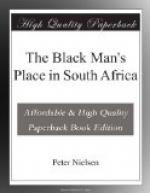We are far too apt to exaggerate both in our disparagement and in our praise of backward people. Many people still think, if they think at all, of the South African Native as a being of the kind imagined by Hobbes when he wrote: “Man in his natural state is towards man as a wolf,” and, on the other hand, there are still many who regard him, after the fancy of Rousseau, as a sort of primitive man-child existing in a state of natural innocence from which he is being driven by the corrupting influence of the civilised invaders. But all this is wrong. The Native is not a savage. Even before the whites came to South Africa the Bantu lived in social order under a political system in which the principles of constitutionalism were clearly recognised. To-day the Bantu are simply a race of barbarians in various stages of transition from a crude civilisation to a highly developed civilisation, and we shall do well to remember that the process of transition which we are now witnessing is one in which individual mistakes and failures will be more conspicuous, though no more significant, than the general advance.
MISCEGENATION.
If it is true that the human nature of the Bantu is no whit different from the human nature of the Europeans then it is a fair question to ask why the two races should not be able to live together in liberty, equality and fraternity as people of one nation or body politic. It is because human nature is governed by laws which, unlike the laws of mathematics, cannot be laid down with certainty that we find ourselves unable to give a positive answer to this question. The human nature of the whites, like the human nature of all races that have been predominant before, is swayed by the feelings of pride and prejudice that arise through differences of complexion, physical appearance and bodily odour, as well as the difference in racial achievement, and these essentially human feelings, if they remain as strong as they now are in South Africa, will render impossible the fraternity that implies the liberty to intermarry, so that there arises for our consideration a second question, namely, whether without full fraternity and social equality the two races may yet live together in the land in political liberty and equality.
We observe from the earliest times a rhythmic play, as it were, of opposite forces that tends, alternately, to build up and to break down and mingle human races, but of the laws that underlie and govern these forces we know little or nothing. On the one hand we see how man has always and everywhere shown what the advocates of so-called racial purity have called “a perverse predisposition to mismate” which has made it exceedingly difficult to classify existing human varieties. On the other hand we see throughout nature how a pronounced disparity between varieties of the same species engenders an aversion from one another of the different varieties which seems to




